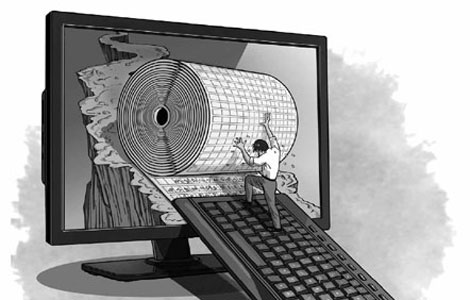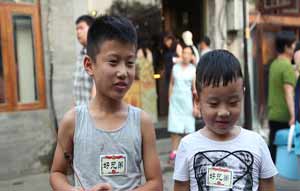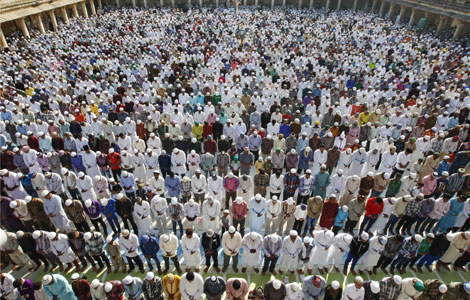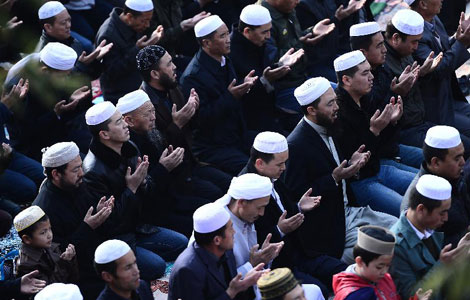The DPRK seesaw continues
Updated: 2013-10-18 08:12
By Jin Qiangyi (China Daily)
|
|||||||||||
The situation on the Korean Peninsula has been swinging back and forth since the Democratic People's Republic of Korea conducted its third nuclear test in February this year. The Kaesong industrial park, jointly run by the DPRK and the Republic of Korea, was reopened on Sept 16 sending signals that the tension on the Korean Peninsula had eased. But within a month, things were back to square one.
Over the weekend, the DPRK issued a fresh warning of launching an "all-out war" against the ROK and the United States because it saw the US-ROK-Japan maritime drills as a threat and also because the ROK media had "slandered the dignity of the supreme leadership of the DPRK". Besides, Pyongyang restarted its Yongbyon nuclear reactor last week, two months after it tested a long-range rocket engine.
The rising tension on the Peninsula is the result of the DPRK's new two-line strategy of economic reconstruction and nuclear development. But the equal emphasis Pyongyang lays on economic reconstruction and nuclear development, known as the "Byungjin Line", is paradoxical. The DPRK cannot sustain its economic development without the help of the international community, but by developing nuclear weapons, it will only invite further sanctions from the international community. In other words, nuclear buildup and economic reconstruction cannot go hand-in-hand for the DPRK.
The DPRK's "Byungjin Line" has created a tricky situation on the Korean Peninsula. Pyonyang, according to its strategic policy, needs to conduct nuclear and missile tests to develop nuclear weapons. But the tense international environment it has created will only harm its already weak economy. Consequently, the DPRK will be forced to ease the tension because of its rising economic needs.
The volatile situation on the Peninsula is a severe challenge for China and the international community. On the DPRK nuclear issue, China has to cooperate with the US and Japan, but it cannot possibly accede to the strategic demands of Washington and Tokyo.
From Washington's point of view, Pyongyang would disrupt the US' dominance in the post-Cold War international order and pose a direct threat to American security if it succeeds in building nuclear weapons. No wonder, the US is determined not to let the DPRK succeed in its designs. But, at the same time, the US is capitalizing on the Peninsula crisis to push through its "pivot" to Asia policy.
Moreover, Japan could use the DPRK's nuclear tests as an excuse to rebuild itself into a major military power. Some Japanese right-wing politicians are determined to amend the pacifist Constitution of the country and revive its militarist past not so much as to thwart the DPRK's "designs" but to contain China's rise.
As a result, China has to strike a delicate balance between imposing sanctions on the DPRK and safeguarding stability on the Korean Peninsula. If Beijing follows Washington, Tokyo and Seoul in imposing tough sanctions on Pyongyang, the situation on the Peninsula could go out of control. But if Beijing does not support the sanctions, it could make Pyongyang more determined to develop nuclear weapons.
Because of the complexity of the issue, different Chinese scholars have different views on how to deal with Pyongyang. The DPRK nuclear issue cannot be resolved in the short run. Resumption of the Six-Party Talks could open new avenues for resolving the issue, but then it could take decades to achieve the denuclearization of the Peninsula. Perhaps there is need to search for channels other than the Six-Party Talks and sanctions to resolve the DPRK nuclear issue.
The best way to tackle the issue would be to convince the DPRK that by opening up to the outside world it will not only end the hostility with the international community but also get untold benefits.
For this to happen, however, all countries have to cooperate to prompt the US and Japan to give up their strategic intent of capitalizing on the DPRK nuclear issue to contain China. If the US and Japan don't abandon their goal vis-a-vis China, a mutually beneficial mechanism cannot be established to help resolve the DPRK nuclear issue.
The international community also has to reflect on the impact of imposing sanctions on Pyongyang. Although sanctions are part of the United Nations framework, they should not be used as a retaliatory weapon to make it impossible for the DPRK to open up to the outside world.
More importantly, the international community has to increase economic exchanges with the DPRK within the scope of UN resolutions - for example, it could help build the Kaesong Industrial Complex, the Rason special economic zone and the Sinuiju special zone to make Pyongyang see the benefits of reform and opening-up.
But irrespective of the measures it takes to denuclearize the Korean Peninsula, the international community has to employ strategic vision and be prepared to encounter difficulties.
The author is a professor of Korean Studies at Yanbian University in Jilin province.
(China Daily 10/18/2013 page9)
Today's Top News
Elderly group sorry about roles in turmoil
US not budging on its arms restrictions on China
Beijing criticizes Abe's shrine offering
UK hails Chinese nuclear investment
US debt deal a temporary fix
Local govt debt not 'fatal' issue: BNP Paribas
FDI increases as economy strengthens
Capitals work together on pollution
Hot Topics
Lunar probe , China growth forecasts, Emission rules get tougher, China seen through 'colored lens', International board,
Editor's Picks

|

|

|

|

|

|





